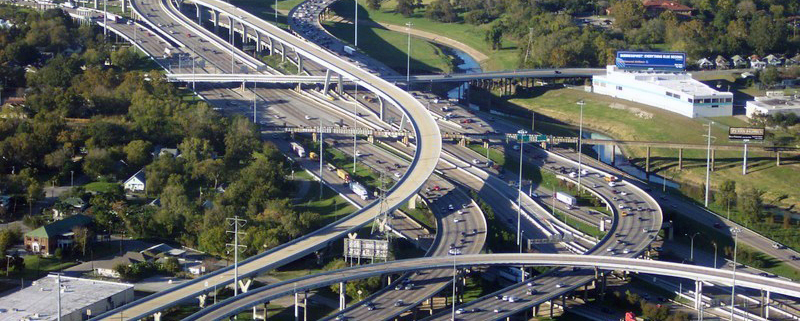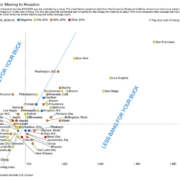Experts Spar Over Induced Demand and Urban Freeway Expansion
This week I have an excellent re-post from Bob Poole at Reason’s Surface Transportation Innovations on induced demand:
Experts Spar Over Induced Demand and Urban Freeway Expansion
I-35 through downtown Austin is massively congested much of the day. That’s hardly surprising since both Austin and Texas have been growing by leaps and bounds for several decades (with no end in sight), while I-35 through central Austin still has not had a significant expansion since 1974. Trying to accommodate today’s traffic flow with the capacity of 50 years ago is like trying to put 10 pounds of potatoes into a 5-pound sack.
Yet opponents of expanding I-35 in Austin raise the concept of “induced demand,” which some refer to as the “iron law of freeway congestion.” The idea is that it’s pointless to add capacity because the improved traffic flow will (only) lead to more vehicles choosing to use the freeway, yielding renewed congestion.
One of those who raised this argument is professor and engineer Kara Kockelman, who teaches transportation engineering at the University of Texas at Austin. In a recent piece by Kelsey Thompson of KXAN, Kockelman said that roadway improvements can lead to people changing their behavior, such as living further out in the suburbs or making trips during peak periods that they used to make at off-peak times. “By opening up I-35,” she told KXAN, “what we do is increase the attractiveness of that corridor for longer distance travel.” Also, after a long construction period, “There’ll be a lot of pent-up demand just waiting to get onto that road when it fully opens,” Kockelman added. That’s all true, but it’s not the end of the story.
At about the same time, another transportation expert, Steven Polzin of Arizona State University, published an article on Planetizen, “Induced Travel Demand Induces Media Attention.” He points out that in fast-growing states, most new highway demand comes from population growth and new jobs, not from “induced” travel. Second, he notes that vehicle miles traveled (VMT) per capita have leveled off in the past decade, so traffic congestion will likely not grow as fast in coming decades, other things equal. Third, Polzin points out that trips accommodated by an expanded highway can provide a number of benefits.
Read the rest of this piece at Houston Strategies.
Tory Gattis is a Founding Senior Fellow with the Urban Reform Institute and co-authored the original study with noted urbanist Joel Kotkin and others, creating a city philosophy around upward social mobility for all citizens as an alternative to the popular smart growth, new urbanism, and creative class movements. He is also an editor of the Houston Strategies blog.
Photo: Dhanix, used under CC 3.0 License.

 Dhanix, used under CC 3.0 License
Dhanix, used under CC 3.0 License

 Brian Bennett, used under CC 2.0 License
Brian Bennett, used under CC 2.0 License



